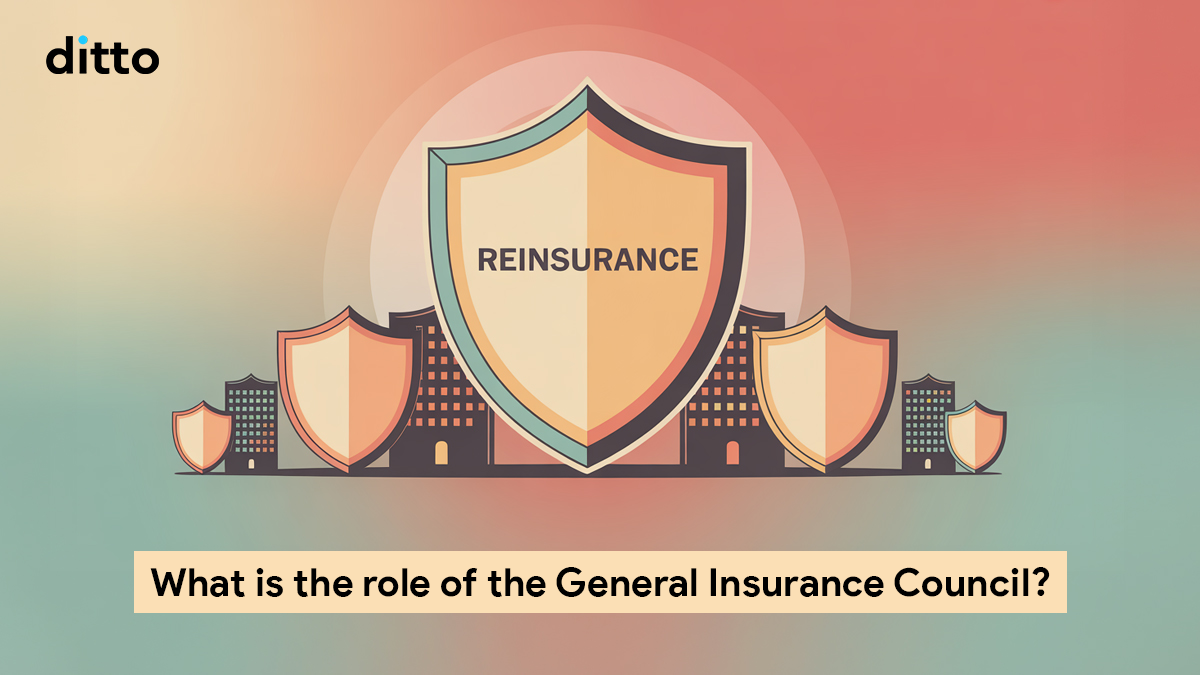General Insurance Council in India (GIC)
Have you ever faced a frustrating delay in your insurance claim or struggled with the fine print in your policy? While the Insurance Regulatory and Development Authority of India (IRDAI) often gets the spotlight, there’s another crucial body that works tirelessly to protect your interests: the General Insurance Council (GIC).
It represents all non-life insurers in India, including general insurance, health insurance, and reinsurance companies. It plays a crucial role in ensuring insurers follow sound practices, serve policyholders fairly, and uphold industry standards.
To compile this guide, we reviewed IRDAI circulars, GIC’s official reports, and recent industry initiatives that highlight how the Council bridges insurers, regulators, and the public.
By the end of this article, you’ll know:
- What the General Insurance Council (GIC) is and how it functions
- How it collaborates with IRDAI to shape policies and protect policyholders
- Why it matters to you: whether you’re a policyholder, insurer, or simply curious about India’s insurance ecosystem
If you'd like to learn more about GIC or how it functions and what impact it has on the policyholders, book a free consultation call, and we'll help guide you.
GIC: Overview & Mandate
The General Insurance Council (GIC) is a statutory body that ensures insurance companies in India are held accountable and adhere to industry standards. Think of it as a watchdog for insurance companies, helping to protect your interests as a policyholder.
So, what does all of this mean for you, as a policyholder? In simple terms, GIC works to make sure that the insurance companies you deal with treat you fairly. It means better claim processing, transparency in your policy, and a more customer-friendly insurance experience overall. For example, the GIC ensures that insurers provide clear explanations for claim rejections and works to minimize your out-of-pocket costs during hospitalization.
How is this different from IRDAI?
While IRDAI is the regulatory authority responsible for creating and enforcing laws and regulations for the insurance sector, the GIC is more of a statutory organization. It provides a framework for insurers to follow, promotes industry growth, and works alongside regulators to ensure fair practices. Essentially, IRDAI oversees the sector’s legal framework, while the GIC ensures that insurers operate in line with those regulations and act in the best interests of consumers.
Now, let’s dive a little deeper into the GIC's structure and governance.
Structure of the GIC (Members & Governance)
Here’s a quick look at who’s involved:
1) Members (who are in the council)
- By law, the General Insurance Council consists of all insurers that carry on general insurance business in India (this includes general insurers, standalone health insurers, and reinsurers).
- The Council’s site lists member companies across public, private, and reinsurance players (a long roster).
2) Governance (how it’s run)
The statutory governing authority is the Executive Committee of the GI Council.
Executive Committee composition (Section 64F(2)):
- 4 elected representatives of the GI Council members (one of these is elected as Chairperson).
- 1 eminent person (not connected with insurance) nominated by IRDAI (“the Authority”).
- 4 IRDAI-nominated representatives for agents, TPAs, surveyors & loss assessors, and policyholders, respectively.
Note: The Secretary to the Executive Committee is nominated by IRDAI (per Section 64F(6)).
These leaders are responsible for setting the direction of the council, ensuring everything is running smoothly, and making decisions about how to improve the industry. The GIC also has subcommittees that focus on specific areas, such as consumer protection and compliance.
Functions and Responsibilities of GIC
Let’s break it down with the help of major activities GIC was responsible for in FY 2023-2024:
1) Digital Infrastructure: Bima Trinity Projects:
GIC played an active role in the development of Bima Sugam, an emerging insurance e-marketplace designed to simplify transactions for insurers, intermediaries, and policyholders alike.
2) Product Innovation: Bima Vistaar:
In collaboration with the government and other stakeholders, GIC helped design Bima Vistaar, a comprehensive insurance product covering life, health, general, and personal accident insurance for families. This product is set to be sold through a dedicated network of Bima Vahaks, further expanding insurance access across the country.
3) Regulatory Review:
Through the Regulatory Review Committee (RRC), in partnership with the Life Council, GIC supported IRDAI’s transition from a rule-based regulatory framework to a more flexible, principle-based regime.
4) Motor Hit & Run Claims:
GIC continued to serve as the nodal agency for the Hit & Run Accident Fund (formerly known as the Solatium Fund), managing and disbursing compensation for motor accident victims nationwide.
5) Health Insurance Reforms:
Efforts in health insurance included expanding cashless claim settlements, developing a common hospital empanelment platform, and negotiating standardized hospital rates to improve affordability and accessibility.
6) Government Collaboration:
GIC engaged with the Ministry of Finance (DFS) on several initiatives, including:
- Claims data management for natural calamities such as cyclones and floods.
- Collaborating with the National Disaster Management Authority (NDMA) on the development of surety bonds and disaster insurance products.
7) Insurance Awareness:
Began planning a nationwide awareness and education campaign to improve insurance literacy across India.
8) Digital Inclusion: JanSuraksha Platform:
Partnered with the Life Insurance Council and Indian Banks’ Association (IBA) to build the JanSuraksha platform: a unified digital access point for PMSBY and PMJJBY schemes, enabling enrollment, claims, grievance redressal, and data reporting. The first phase covers 12 public sector banks, representing ~80% of all such policies.
Impact on Policyholders and Insurers
1) For Policyholders
GIC guides and coordinates industry standards while also playing a significant role in protecting your interests. While the grievances are handled via CIO and IRDAI-mandated insurer mechanisms, GIC’s role is industry coordination and initiatives that we’ll cover in a later section.
2) For Insurers
For insurance companies, the GIC is like a guide. It supports them in adopting best practices and fosters a healthy, competitive market. Plus, by advocating for fair regulations, the GIC helps ensure that insurers can thrive in a stable and predictable environment.
General Insurance Council (GIC): Collaboration with the IRDAI
While IRDAI regulates, GIC acts as the industry’s collective voice by providing inputs, coordination, and feedback that help shape a fair, efficient, and evolving insurance ecosystem.
1) Providing Regulatory Input
GIC gathers insights from its member insurers on operational challenges, claims processes, and emerging risks. It submits recommendations to IRDAI on matters like expense management, commissions, and policyholder service standards (as allowed under Section 64L of the Insurance Act). This ensures that regulatory decisions reflect on-ground realities while maintaining consumer protection.
2) Co-Developing Industry Guidelines
IRDAI often works with GIC to draft or refine operational frameworks, for example, in areas such as health insurance standardization, digital claim processing, and fraud prevention. Through such collaboration, best-practice guidelines and uniform procedures emerge, helping insurers improve service delivery while keeping the customer’s interests at the center.
3) Supporting Policy Reforms
As new challenges arise (such as technology adoption, climate risk, and cyber insurance), IRDAI seeks structured industry feedback through GIC. GIC consolidates insurer perspectives, conducts studies or pilots, and submits reform proposals, ensuring that rule changes are both progressive and practical
GIC also works closely with the Insurance Regulatory and Development Authority of India (IRDAI) on several key initiatives. For example, they worked on the “Insurance for All by 2047” vision and put in efforts to streamline and improve the ease of doing business within the sector.
Moving from collaboration to action, here are some of the significant projects and initiatives that GIC has recently rolled out to enhance the insurance landscape.
Flagship Initiatives by General Insurance Council (GIC)
1) Cashless Everywhere (Health Insurance)
It allows policyholders to seek cashless hospitalisation at any hospital (networked or non-networked), subject to admissibility and the insurer's Terms and Conditions. It was launched from January 24 to 26, 2024, by GIC with industry participation.
2) Hospitals Disputes Resolution Portal (pilot)
A portal for hospitals to escalate non-payment of authorised cashless claims: pilot in Maharashtra, Tamil Nadu, Karnataka; to be expanded. (Direct access page: hospital dispute app.)
3) Hit-and-Run Motor Accident Compensation (Scheme 2022)
Public awareness + operational role around the scheme that pays ₹2,00,000 (death) or ₹50,000 (grievous hurt); GIC facilitates claims and releases the compensation post sanction.
4) Nationwide insurance-awareness campaigns
The industry (through/with GIC) committed ~₹100 crore annually for 3-5 years to run a pan-India awareness campaign (2025). You’ll also see “Achha Kiya Insurance Liya” branded outreach.
Why Choose Ditto for Insurance?
At Ditto, we’ve assisted over 8,00,000 customers with choosing the right insurance policy. Why customers like Abhinav below love us:

- No-Spam & No Salesmen
- Rated 4.9/5 on Google Reviews by 15,000+ happy customers
- Backed by Zerodha
- 100% Free Consultation
You can book a FREE consultation. Slots are running out, so make sure you book a call now!
Conclusion
The General Insurance Council plays a pivotal role in shaping the future of India’s general insurance industry by fostering collaboration, influencing policy, and promoting a positive industry image. Through proactive engagement with policymakers, regulatory bodies, and the public, GIC ensures the industry's collective strength and reputation are upheld. By unifying stakeholders and providing strategic guidance, the Council fosters responsible growth and enhances public trust in general insurance nationwide.
FAQs
How can policyholders reach the GIC for grievance redressal or support?
If you’re facing an issue with your insurer, start by contacting their grievance cell. If the problem isn’t resolved, you can escalate the matter to the GIC, which will help facilitate a fair resolution.
What are its core functions in India?
- Setting self-regulation standards for the industry
- Advocating for fair policies and consumer protection
- Educating both consumers and insurers
- Developing industry policies in collaboration with regulators
- Resolving disputes between insurers and policyholders
How does GIC ensure that policyholders’ interests are protected?
The GIC ensures that all insurers follow fair practices and operate transparently. It promotes better service standards, monitors how insurers handle complaints, and intervenes when necessary to resolve disputes. Additionally, by promoting consumer education, the GIC enables policyholders to make more informed decisions.
How does GIC collaborate with IRDAI to enhance insurance regulations?
The GIC acts as a bridge between insurers and the regulator (IRDAI). It shares industry insights, provides feedback on proposed rules, and suggests improvements based on ground realities. This ensures that the regulations are practical, balanced, and in the interest of both insurers and consumers.
What impact does GIC have on the overall growth of the insurance sector?
The GIC helps create a more transparent, trustworthy insurance ecosystem. By promoting industry-wide standards and encouraging best practices, it builds consumer confidence and supports healthy competition among insurers—both of which are crucial for long-term growth.
Last updated on:










